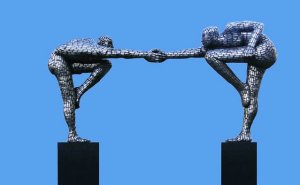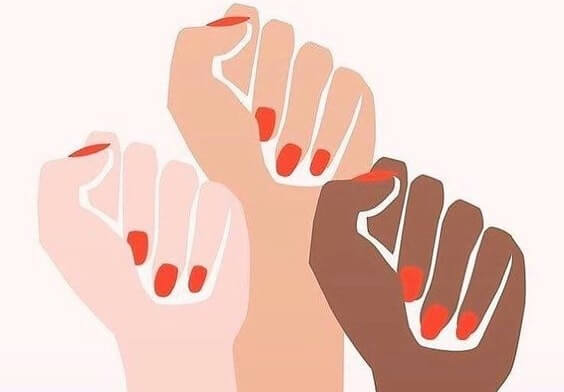The Power is in Your Values

The best example of this is undoubtedly Gandhi. He was able to defeat an empire with his convictions and renouncing any type of violence. However, there are many everyday heroes with the same message: the power is in your values.
Throughout history, many people suffered adversity only to defend their convictions. These people showed amazing strength. This strength comes from within, from what’s in our own minds and hearts. It doesn’t come from having any physical or economic superiority. Rather, they’re able to keep going and often succeed because of their moral superiority.
“Your values define who you truly are. Your true identity is the sum total of your values.”
-Assegid Habtewold-
This also happens in our everyday lives. We’re capable of facing unfair and shameful situations because our values act as the compass that guides us. The same happens with our goals, as we’re able to pursue them when they’re based on clear and defined values. This is where our strength comes from. This is what allows us to keep on fighting.
Why is the power in our values?
Ethics are the deepest foundation of an individual. Values make a society coherent. This is because they allow interaction and coexistence. These agreements, both implicit and explicit, about what’s good or desirable and bad or undesirable, are what create the social fabric.

According to Jean Piaget, autonomous ethics are the highest level of moral evolution. We can reach them only when our intelligence has developed enough. They’re the product of a long maturing process that starts in anomie, the complete lack of values with which we’re born, to autonomy, which is the capacity of thinking for ourselves and reaching our own conclusions.
Besides their social importance, ethics also play a decisive role in one’s individual life. Ethics guide actions and give purpose to them. Also, they give us the strength to deal with hardship and not give up during difficult times.
For some, these ethics are based or even dictated and imposed by religion. Consequently, these people hold on to their religious principles during rough times. For others, they’re grounded on a certain philosophy, thesis, or belief. Moreover, there are people who give up on their values and adopt a pragmatic, cynical attitude towards life. In the same way, they also don’t give meaning to their actions. Although they protect themselves from disappointment by doing so, this also doesn’t let them live life to the fullest.
Conduct and values
Human beings go through an evolution process long before building personal values. Not all of them reach the end of this process. Many remain stuck in a stage known as heteronomy. In this stage, the child (or the adult) doesn’t act based on their convictions. Instead, they’re guided by what authority figures impose on them. What’s right or wrong is determined by these figures and one’s main goal becomes not contradicting this authority figure.

When moral development reaches its highest level, our only authority is our own conscience. Unlike the other stages, we don’t adopt values based on tradition, repetition, or because an authority figure says so. Our values are the product of personal reflection and can always go against what the members of a society support. In other words, they’re autonomous.
Values are meanings. They’re attributes that one considers desirable or worthy of advancing. Values guide conduct and give purpose to actions. They imply a commitment: aligning with the side one considers to be right or correct. Ethics are flexible. They always depend on a conscious evaluation of different situations. This is exactly why the power is in the values, because they depend on one’s own conscience and don’t come from external impositions or improvisation.
Reflecting on our own perspective
There comes a point in which it’s convenient for us to think about the values directing our actions. Sometimes, we adhere to principles merely out of habit or tradition or only because they’re what most people agree on. Following external values is precisely what makes us feel lost from time to time. Ethics allow our intentions and actions to stay aligned and give us the strength to go after what we really want.
The best example of this is undoubtedly Gandhi. He was able to defeat an empire with his convictions and renouncing any type of violence. However, there are many everyday heroes with the same message: the power is in your values.
Throughout history, many people suffered adversity only to defend their convictions. These people showed amazing strength. This strength comes from within, from what’s in our own minds and hearts. It doesn’t come from having any physical or economic superiority. Rather, they’re able to keep going and often succeed because of their moral superiority.
“Your values define who you truly are. Your true identity is the sum total of your values.”
-Assegid Habtewold-
This also happens in our everyday lives. We’re capable of facing unfair and shameful situations because our values act as the compass that guides us. The same happens with our goals, as we’re able to pursue them when they’re based on clear and defined values. This is where our strength comes from. This is what allows us to keep on fighting.
Why is the power in our values?
Ethics are the deepest foundation of an individual. Values make a society coherent. This is because they allow interaction and coexistence. These agreements, both implicit and explicit, about what’s good or desirable and bad or undesirable, are what create the social fabric.

According to Jean Piaget, autonomous ethics are the highest level of moral evolution. We can reach them only when our intelligence has developed enough. They’re the product of a long maturing process that starts in anomie, the complete lack of values with which we’re born, to autonomy, which is the capacity of thinking for ourselves and reaching our own conclusions.
Besides their social importance, ethics also play a decisive role in one’s individual life. Ethics guide actions and give purpose to them. Also, they give us the strength to deal with hardship and not give up during difficult times.
For some, these ethics are based or even dictated and imposed by religion. Consequently, these people hold on to their religious principles during rough times. For others, they’re grounded on a certain philosophy, thesis, or belief. Moreover, there are people who give up on their values and adopt a pragmatic, cynical attitude towards life. In the same way, they also don’t give meaning to their actions. Although they protect themselves from disappointment by doing so, this also doesn’t let them live life to the fullest.
Conduct and values
Human beings go through an evolution process long before building personal values. Not all of them reach the end of this process. Many remain stuck in a stage known as heteronomy. In this stage, the child (or the adult) doesn’t act based on their convictions. Instead, they’re guided by what authority figures impose on them. What’s right or wrong is determined by these figures and one’s main goal becomes not contradicting this authority figure.

When moral development reaches its highest level, our only authority is our own conscience. Unlike the other stages, we don’t adopt values based on tradition, repetition, or because an authority figure says so. Our values are the product of personal reflection and can always go against what the members of a society support. In other words, they’re autonomous.
Values are meanings. They’re attributes that one considers desirable or worthy of advancing. Values guide conduct and give purpose to actions. They imply a commitment: aligning with the side one considers to be right or correct. Ethics are flexible. They always depend on a conscious evaluation of different situations. This is exactly why the power is in the values, because they depend on one’s own conscience and don’t come from external impositions or improvisation.
Reflecting on our own perspective
There comes a point in which it’s convenient for us to think about the values directing our actions. Sometimes, we adhere to principles merely out of habit or tradition or only because they’re what most people agree on. Following external values is precisely what makes us feel lost from time to time. Ethics allow our intentions and actions to stay aligned and give us the strength to go after what we really want.
All cited sources were thoroughly reviewed by our team to ensure their quality, reliability, currency, and validity. The bibliography of this article was considered reliable and of academic or scientific accuracy.
- Guillemin, M., & Gillam, L. (2004). Ethics, reflexivity, and “Ethically important moments” in research. Qualitative Inquiry. https://doi.org/10.1177/1077800403262360
- Ryan, R. M., & Deci, E. L. (2006). Self-regulation and the problem of human autonomy: Does psychology need choice, self-determination, and will? Journal of Personality. https://doi.org/10.1111/j.1467-6494.2006.00420.x
- D’Arms, J., & Jacobson, D. (2000). Sentiment and Value. Ethics. https://doi.org/10.1086/233371
This text is provided for informational purposes only and does not replace consultation with a professional. If in doubt, consult your specialist.







